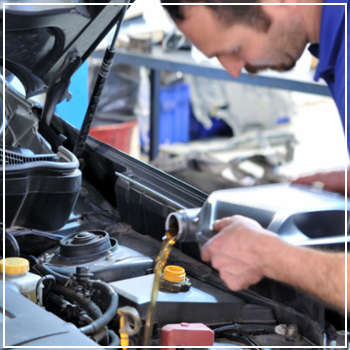 Once your car exceeds the 75,000-mile mark, you will likely be asked about high-mileage oil at your next auto body appointment. Unfortunately, the benefits are not always made apparent when you’re put on the spot. This solution may seem like a bells-and-whistles package, but it’s important to understand what this product is and when you might need it.
Once your car exceeds the 75,000-mile mark, you will likely be asked about high-mileage oil at your next auto body appointment. Unfortunately, the benefits are not always made apparent when you’re put on the spot. This solution may seem like a bells-and-whistles package, but it’s important to understand what this product is and when you might need it.
What is High-Mileage Oil?
Regardless of brand, high-mileage solutions are geared toward vehicles with more than 75,000 miles, as they contain additives that help reduce engine wear. A mix of synthetic and petroleum-based oils create a thicker consistency reduces leaks through seals.
As your engine starts to show signs of wear and age, high-mileage oil is less likely to drip onto the pavement below.
Compared to conventional oil, the high-mileage formula generally has a mix of:
- Seal conditioners, meant to place less wear on gaskets and seals
- Viscosity modifiers, ensuring the oil remains thicker as it cycles through the engine
- Detergents that help break down carbon and debris
- Friction modifiers
- Anti-corrosion properties
High-mileage oils also tend to be synthetic blends, which offer greater temperature stability and a longer lifespan than traditional petroleum-based solutions. Throughout the year, the solution won’t excessively thicken in the cold or thin out in summer, and has an easier time flowing through the engine to ward off wear and metal-on-metal friction.
Do Engines Need High-Mileage Oil?
Until the 1990s, car engines lasted roughly 130,000 miles. Modern vehicles now offer double or longer, especially with the right amount of maintenance and lubrication.
While high-quality designs and parts contribute to this longevity, your car’s engine is not indestructible. Close to the 100,000-mile mark, signs of aging start to emerge. These include:
- Debris and buildup accumulating on piston rings and the crankshaft
- Worn rings and valve seals
- Greater oil consumption
- Lesser, lower-quality compression, often created through worn out valves and seals
- Worn-down cylinders
- Shrunken, dried-out gaskets
Parts wear out at different rates, but how well you maintain your engine plays a major role. Small, key signs may appear early, including:
- Oil drips from underneath the car
- Your engine sounds louder or has more of a roar
- You hear a rattling sound as you’re driving
At this point, high-mileage oil lessens the wear placed on these parts:
- Seals are less likely to dry out and crack
- The thicker consistency is less likely to leak out
- The additives and consistency help keep the engine lubricated, reducing friction and slowing down wear
- They may help the engine keep a more consistent temperature
The Benefits of High-Mileage Oil
When it comes to engine longevity, high-mileage oil has many advantages over traditional oil.
Helps Combat Leaks
Think about your engine and its wholistic functionality. When seals and gaskets dry out, shrink or crack, oil passes through. You’ll spot it dripping onto the asphalt below, but it can also get into your car’s combustion chambers, where it starts to burn. Treating your gaskets and seals well offers a two-fold benefit: Less engine damage and your car consumes less oil over time.
Cleans the Engine
Wear and inefficient maintenance cause debris to build up on parts and circulate through your engine. With time, this hampers its efficiency and could lead to long-term damage. With high-mileage oil, the additives – particularly conditioners and anti-corrosion elements – help with controlling the “sludge” that ultimately places a greater deal of wear on the engine’s moving parts.
When Not to Choose High-Mileage Oil
Despite these benefits, there are some instances in which high-mileage oil likely is not worth it.
Your Engine Isn’t Showing Signs of Wear
Once your car gets to the 75,000-mile mark, look for leaks and how frequently you go through oil. Generally, if your car doesn’t seem to be leaking from underneath and a quart lasts you roughly 6,000 miles, conventional oil might be fine for now, assuming you’ll remain vigilant about maintenance.
It Doesn’t Make Up For Negligent Maintenance
Greater viscosity and conditioners don’t solve everything. If you have ignored oil changes, put your car through a great deal of city driving or neglect concerning issues, high-mileage oil is a drop in the bucket. If your car experiences loss of power, blowby or regularly makes strange noises, it’s likely having mechanical issues.
Whether your car needs an oil change or more extensive maintenance, bring it to DaSilva’s for quality work at affordable rates. To schedule an appointment at our Naugatuck shop, give us a call today.




